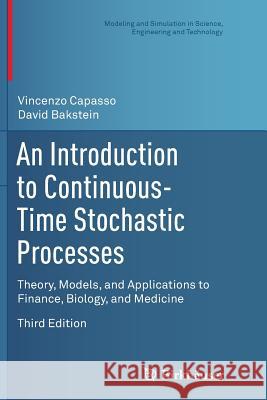An Introduction to Continuous-Time Stochastic Processes: Theory, Models, and Applications to Finance, Biology, and Medicine » książka
An Introduction to Continuous-Time Stochastic Processes: Theory, Models, and Applications to Finance, Biology, and Medicine
ISBN-13: 9781493938360 / Angielski / Miękka / 2016 / 482 str.
An Introduction to Continuous-Time Stochastic Processes: Theory, Models, and Applications to Finance, Biology, and Medicine
ISBN-13: 9781493938360 / Angielski / Miękka / 2016 / 482 str.
(netto: 249,17 VAT: 5%)
Najniższa cena z 30 dni: 250,57
ok. 16-18 dni roboczych.
Darmowa dostawa!
This textbook, now in its third edition, offers a rigorous and self-contained introduction to the theory of continuous-time stochastic processes, stochastic integrals, and stochastic differential equations. Expertly balancing theory and applications, the work features concrete examples of modeling real-world problems from biology, medicine, industrial applications, finance, and insurance using stochastic methods. No previous knowledge of stochastic processes is required. Key topics include: Markov processes Stochastic differential equations Arbitrage-free markets and financial derivatives Insurance risk Population dynamics, and epidemics Agent-based models New to the Third Edition: Infinitely divisible distributions Random measures Levy processes Fractional Brownian motion Ergodic theory Karhunen-Loeve expansion Additional applications Additional exercises Smoluchowski approximation of Langevin systems An Introduction to Continuous-Time Stochastic Processes, Third Edition will be of interest to a broad audience of students, pure and applied mathematicians, and researchers and practitioners in mathematical finance, biomathematics, biotechnology, and engineering. Suitable as a textbook for graduate or undergraduate courses, as well as European Masters courses (according to the two-year-long second cycle of the "Bologna Scheme"), the work may also be used for self-study or as a reference. Prerequisites include knowledge of calculus and some analysis; exposure to probability would be helpful but not required since the necessary fundamentals of measure and integration are provided. From reviews of previous editions: "The book is ... an account of fundamental concepts as they appear in relevant modern applications and literature. ... The book addresses three main groups: first, mathematicians working in a different field; second, other scientists and professionals from a business or academic background; third, graduate or advanced undergraduate students of a quantitative subject related to stochastic theory and/or applications." -Zentralblatt MATH











